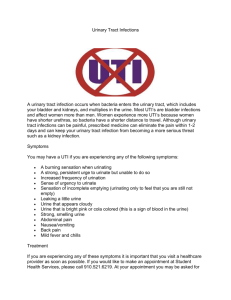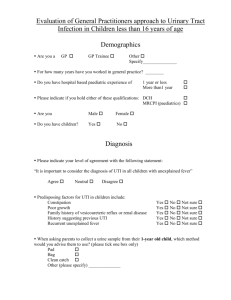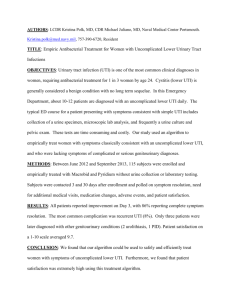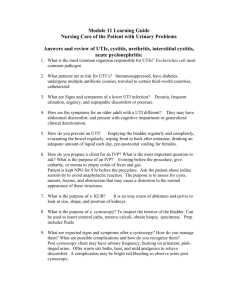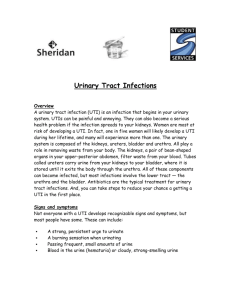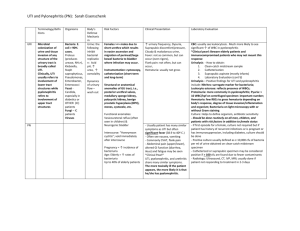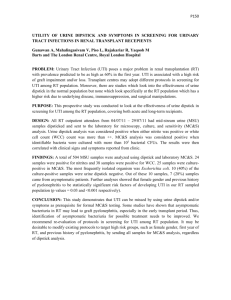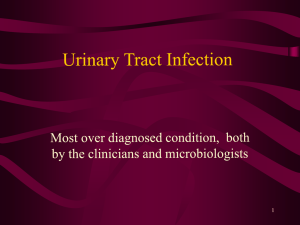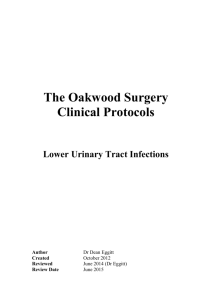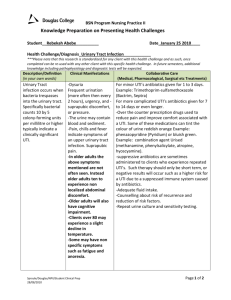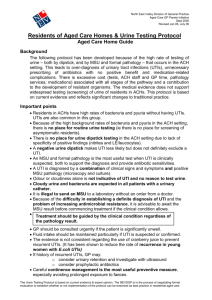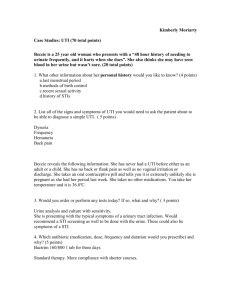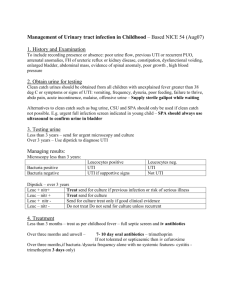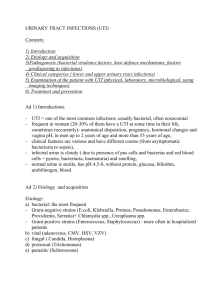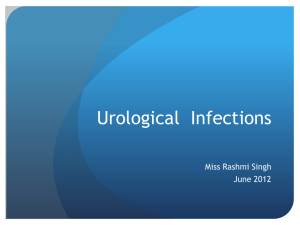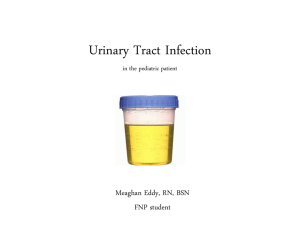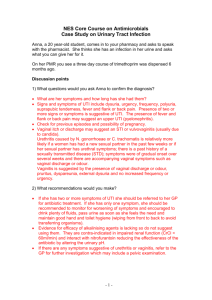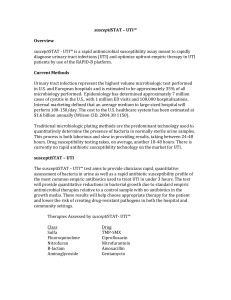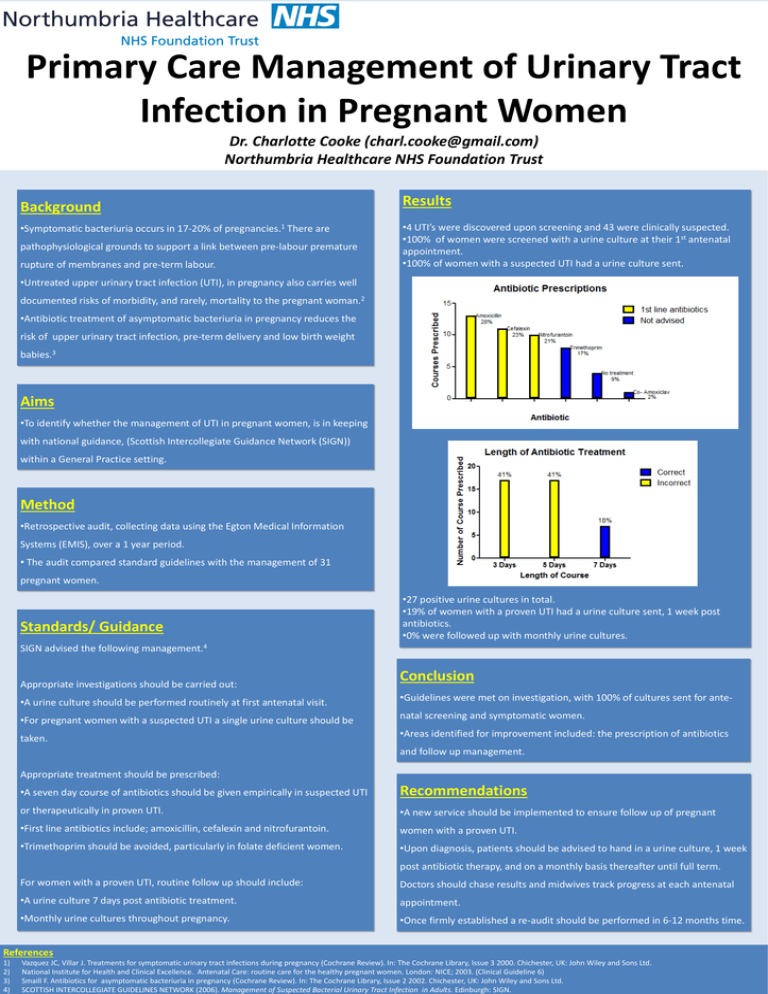
Primary Care Management of Urinary Tract
Infection in Pregnant Women
Dr. Charlotte Cooke (charl.cooke@gmail.com)
Northumbria Healthcare NHS Foundation Trust
Background
•Symptomatic bacteriuria occurs in 17-20% of pregnancies.1 There are
pathophysiological grounds to support a link between pre-labour premature
rupture of membranes and pre-term labour.
Results
•4 UTI’s were discovered upon screening and 43 were clinically suspected.
•100% of women were screened with a urine culture at their 1st antenatal
appointment.
•100% of women with a suspected UTI had a urine culture sent.
•Untreated upper urinary tract infection (UTI), in pregnancy also carries well
documented risks of morbidity, and rarely, mortality to the pregnant woman.2
•Antibiotic treatment of asymptomatic bacteriuria in pregnancy reduces the
risk of upper urinary tract infection, pre-term delivery and low birth weight
babies.3
Aims
•To identify whether the management of UTI in pregnant women, is in keeping
with national guidance, (Scottish Intercollegiate Guidance Network (SIGN))
within a General Practice setting.
Method
•Retrospective audit, collecting data using the Egton Medical Information
Systems (EMIS), over a 1 year period.
• The audit compared standard guidelines with the management of 31
pregnant women.
Standards/ Guidance
•27 positive urine cultures in total.
•19% of women with a proven UTI had a urine culture sent, 1 week post
antibiotics.
•0% were followed up with monthly urine cultures.
SIGN advised the following management.4
Appropriate investigations should be carried out:
Conclusion
•A urine culture should be performed routinely at first antenatal visit.
•Guidelines were met on investigation, with 100% of cultures sent for ante-
•For pregnant women with a suspected UTI a single urine culture should be
natal screening and symptomatic women.
taken.
•Areas identified for improvement included: the prescription of antibiotics
and follow up management.
Appropriate treatment should be prescribed:
•A seven day course of antibiotics should be given empirically in suspected UTI
Recommendations
or therapeutically in proven UTI.
•A new service should be implemented to ensure follow up of pregnant
•First line antibiotics include; amoxicillin, cefalexin and nitrofurantoin.
women with a proven UTI.
•Trimethoprim should be avoided, particularly in folate deficient women.
•Upon diagnosis, patients should be advised to hand in a urine culture, 1 week
post antibiotic therapy, and on a monthly basis thereafter until full term.
For women with a proven UTI, routine follow up should include:
Doctors should chase results and midwives track progress at each antenatal
•A urine culture 7 days post antibiotic treatment.
appointment.
•Monthly urine cultures throughout pregnancy.
•Once firmly established a re-audit should be performed in 6-12 months time.
References
1)
2)
3)
4)
Vazquez JC, Villar J. Treatments for symptomatic urinary tract infections during pregnancy (Cochrane Review). In: The Cochrane Library, Issue 3 2000. Chichester, UK: John Wiley and Sons Ltd.
National Institute for Health and Clinical Excellence. Antenatal Care: routine care for the healthy pregnant women. London: NICE; 2003. (Clinical Guideline 6)
Smaill F. Antibiotics for asymptomatic bacteriuria in pregnancy (Cochrane Review). In: The Cochrane Library, Issue 2 2002. Chichester, UK: John Wiley and Sons Ltd.
SCOTTISH INTERCOLLEGIATE GUIDELINES NETWORK (2006). Management of Suspected Bacterial Urinary Tract Infection in Adults. Edinburgh: SIGN.

